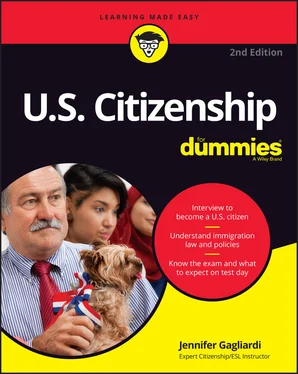Jennifer Gagliardi - U.S. Citizenship For Dummies
Здесь есть возможность читать онлайн «Jennifer Gagliardi - U.S. Citizenship For Dummies» — ознакомительный отрывок электронной книги совершенно бесплатно, а после прочтения отрывка купить полную версию. В некоторых случаях можно слушать аудио, скачать через торрент в формате fb2 и присутствует краткое содержание. Жанр: unrecognised, на английском языке. Описание произведения, (предисловие) а так же отзывы посетителей доступны на портале библиотеки ЛибКат.
- Название:U.S. Citizenship For Dummies
- Автор:
- Жанр:
- Год:неизвестен
- ISBN:нет данных
- Рейтинг книги:3 / 5. Голосов: 1
-
Избранное:Добавить в избранное
- Отзывы:
-
Ваша оценка:
- 60
- 1
- 2
- 3
- 4
- 5
U.S. Citizenship For Dummies: краткое содержание, описание и аннотация
Предлагаем к чтению аннотацию, описание, краткое содержание или предисловие (зависит от того, что написал сам автор книги «U.S. Citizenship For Dummies»). Если вы не нашли необходимую информацию о книге — напишите в комментариях, мы постараемся отыскать её.
U.S. Citizenship For Dummies
U.S. Citizenship For Dummies
U.S. Citizenship For Dummies — читать онлайн ознакомительный отрывок
Ниже представлен текст книги, разбитый по страницам. Система сохранения места последней прочитанной страницы, позволяет с удобством читать онлайн бесплатно книгу «U.S. Citizenship For Dummies», без необходимости каждый раз заново искать на чём Вы остановились. Поставьте закладку, и сможете в любой момент перейти на страницу, на которой закончили чтение.
Интервал:
Закладка:
Issuing passports (approximately 11.71 million U.S. passports were issued in 2020 alone)
Providing information about safely traveling and living abroad
Warning travelers of particularly dangerous areas
Helping U.S. citizens traveling overseas to obtain emergency funds
Checking on the whereabouts or welfare of U.S. citizens traveling or living abroad
Helping families in the event a U.S. citizen’s loved one dies while traveling overseas
Aiding U.S. travelers who become sick while traveling overseas
Providing assistance to U.S. travelers who get arrested overseas
Assisting in international adoptions and custody disputes
Protecting and assisting U.S. citizens living or traveling abroad during international crises
Distributing federal benefits payments
Assisting with oversees absentee voting and Selective Service registration
In addition to providing services to U.S. citizens, the Department of State issues visas for foreigners who want to enter the United States. In fact, they issued more than 240,000 immigrant visas and 4 million nonimmigrant visas in 2020 (down from a recent high of 617,000 immigrant visas and 10 million nonimmigrant visas in 2016). When it comes time for you to get a visa, whether it is a temporary visa or a permanent visa, you’ll deal with the Department of State.
 The USCIS must first approve your immigrant visa before forwarding it to the National Visa Center (NVC), a processing facility of the U.S. State Department, for further processing. The NVC will issue more paperwork for you to complete, and when you’ve completed that paperwork satisfactorily, the NVC will assign you an immigrant visa number. The State Department issues a monthly guide called the Visa Bulletin, explaining the status of various classes of immigrant visas. The Visa Bulletin charts visa availability for both family- and employer-sponsored immigrants based on priority date (the date the sponsoring petition was filed). Some categories, such as the fourth preference for siblings of U.S. citizens, are usually several years behind, while other categories may be current. (You can find out more about preference categories in Chapter 3.)
The USCIS must first approve your immigrant visa before forwarding it to the National Visa Center (NVC), a processing facility of the U.S. State Department, for further processing. The NVC will issue more paperwork for you to complete, and when you’ve completed that paperwork satisfactorily, the NVC will assign you an immigrant visa number. The State Department issues a monthly guide called the Visa Bulletin, explaining the status of various classes of immigrant visas. The Visa Bulletin charts visa availability for both family- and employer-sponsored immigrants based on priority date (the date the sponsoring petition was filed). Some categories, such as the fourth preference for siblings of U.S. citizens, are usually several years behind, while other categories may be current. (You can find out more about preference categories in Chapter 3.)
 To access the Visa Bulletin go to the State Department website (
To access the Visa Bulletin go to the State Department website ( www.state.gov ). You can obtain past issues of the Visa Bulletin at https://travel.state.gov/content/travel/en/legal/visa-law0/visa-bulletin.html .
HOW THE STATE DEPARTMENT HELPS ASYLUM SEEKERS
The State Department also has a huge impact on refugees and those seeking asylum — the millions of people each year who are displaced by war, famine, and civil and political unrest or those who are escaping persecution and the risk of death and torture in their home countries.
The difference between those seeking asylum and refugee admission is important. A refugee is someone who is living outside the United States and outside their home country who petitions the U.S. government for lawful permanent residence in order to escape intolerable conditions in their home country. An asylum-seeker is someone already in the United States or someone seeking admission at a U.S. entry point when they apply to the U.S. government for permission to stay.
State Department Bureau of Population, Refugees, and Migration
The Bureau of Population, Refugees, and Migration (PRM) is a bureau within the United States Department of State. It has primary responsibility for formulating policies on population, refugees, and migration, and for administering U.S. refugee assistance and admissions programs. It develops policy, coordinates funding, and manages refugee resettlement in the United States with the UN Refugee Agency (UNHCR), the International Committee of the Red Cross (ICRC), and other aid groups.
Each year, the State Department prepares a report to Congress on proposed refugee admissions. Congress then advises the president on the proposed ceilings (limits) on refugee admissions for that fiscal (financial) year. Asylum-seekers are not subject to the refugee admissions set by Congress — at least not until they become asylees (those granted asylum) and seek permanent residence.
 According to the Secretary of State, for the 2022 fiscal year (October 1, 2021, through September 30, 2022), the total ceiling is set at 125,000 admissions, divided among six geographic regions and a catchall unallocated category. Here’s how those 125,000 admissions are divided:
According to the Secretary of State, for the 2022 fiscal year (October 1, 2021, through September 30, 2022), the total ceiling is set at 125,000 admissions, divided among six geographic regions and a catchall unallocated category. Here’s how those 125,000 admissions are divided:
Africa: 40,000
East Asia: 15,000
Europe and Central Asia: 10,000
Latin America and the Caribbean: 15,000
The Near East and South Asia: 35,000
Unallocated reserve: 10,000
The Department of Labor (DOL)
The U.S. Department of Labor (DOL) is responsible for protecting the nation’s workforce by making sure that workers enjoy safe conditions and fair employment practices. If you’re applying for immigration through employment, your potential employer and your employer’s attorneys will need to interact with the DOL.
Before a U.S. employer can hire a foreign worker, the employer will usually have to first obtain a DOL-issued labor certification. The certification is the DOL’s way of officially letting the USCIS know that there are no qualified U.S. workers available and willing to work at the prevailing wage in the occupation for which the employer wants to hire a foreign worker. For further information about the required labor certifications, visit the Foreign Labor Application Gateway at www.flag.dol.gov .
After a labor certification is obtained, the potential employer must petition the USCIS. For the proper forms, see the USCIS Working in the United States web page at www.uscis.gov/working-in-the-united-states . If everything passes USCIS approval, the case then goes to the National Visa Center ( https://travel.state.gov/content/travel/en/us-visas/immigrate/national-visa-center.html ) to await a visa number, or if you are in the United States, you may be eligible to apply for adjustment of status. Even if the DOL issues a certification, you aren’t guaranteed a visa. Whether you get a visa is ultimately up to the USCIS or State Department and also depends on visa availability. Nonetheless, applicants for a labor certification must prove they’re able to pass other necessary immigration qualifications, like those outlined in Chapter 3.
The Federal Bureau of Investigation (FBI)
The Federal Bureau of Investigation (FBI) is the national law-enforcement agency in the U.S. The FBI’s headquarters in Washington, D.C., provides direction and support to 56 field offices, about 400 satellite offices, 4 specialized field installations, and more than 40 liaison posts. Each foreign liaison office is headed by a legal officer who works with both U.S. and local authorities abroad on criminal matters that fall under FBI jurisdiction, including cases of immigration and visa fraud.
Even if you’re an immigrant already living in the United States, you’ll have some dealings with the FBI, because applicants for all immigration benefits are required by law to have their fingerprints taken by the USCIS or a designated state or local law-enforcement agency. The fingerprints are then checked against the FBI’s international database. Before allowing you to live here, the U.S. government wants to make sure you’re not currently wanted for any crimes and that your record is free from crimes that present bars to immigration and naturalization (you can find more about this in Chapter 3). If your record has nothing to show, you may never realize you had a brush with the FBI, but rest assured that your USCIS-obtained fingerprints did.
Читать дальшеИнтервал:
Закладка:
Похожие книги на «U.S. Citizenship For Dummies»
Представляем Вашему вниманию похожие книги на «U.S. Citizenship For Dummies» списком для выбора. Мы отобрали схожую по названию и смыслу литературу в надежде предоставить читателям больше вариантов отыскать новые, интересные, ещё непрочитанные произведения.
Обсуждение, отзывы о книге «U.S. Citizenship For Dummies» и просто собственные мнения читателей. Оставьте ваши комментарии, напишите, что Вы думаете о произведении, его смысле или главных героях. Укажите что конкретно понравилось, а что нет, и почему Вы так считаете.












